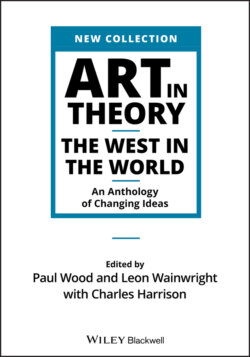Читать книгу Art in Theory - Группа авторов - Страница 139
IIC5 Voltaire (François‐Marie Arouet; 1694–1778) from ‘Essay on Taste’
ОглавлениеThe openness to non‐European civilizations evidenced in Voltaire’s Essai sur les moeurs (cf. IIC4) did not always extend to their art. While he was capable of surpassing a Judaeo‐Christian estimation of the intellectual, religious and moral dimensions of other societies, his socio‐cultural radicalism was balanced by something altogether more conventional when it came to matters of ‘taste’. For Voltaire, as indeed for many later writers on art, ‘taste’ as it related to aesthetic responses to artistic form (as distinct from individual preferences for certain foods, etc.) had an objective aspect. In the 1960s, as part of the debate over the ‘crisis of Modernism’, the critic Clement Greenberg wrote that it was no more possible to dislike good art – or to like bad art – than it was to have ‘sugar taste sweet or lemons taste sour’. This tension between ‘taste’ as a natural faculty and as something it is possible to educate through experience is arguably one that has never been satisfactorily resolved. On its other side, however, lies a total subjectivism that flies in the face of any settled notion of lasting values. To thinkers of the eighteenth‐century European Enlightenment, cultural pluralism seldom extended to aesthetics. In the present extract, Voltaire is in no doubt that taste in matters of art is restricted to Europe, and other places, including ‘uncultivated wastes’ lacking civil society (i.e. America), countries where ‘all representations of living creatures’ are ‘prohibited by religion’ (i.e. the Islamic sphere), and ‘Asiaticks’ (presumably China and India), simply lack it. The extracts are from Voltaire’s ‘Essay on Taste’ [1757], published as a supplement to Alexander Gerard’s An Essay on Taste, London: A. Millar, and Edinburgh: A. Kincaid and J. Bell, 1759, pp. 213, 215 and 221–2. (A variant extract from the essay can be found in Art in Theory 1648–1815, IIIb8, pp. 531–2.)
The external sense with which nature has furnished us, and by which we distinguish and relish the various kinds of nourishment, that are adapted to health and pleasure, has in all languages given occasion to the metaphorical word taste, by which we express our perception of beauty, deformity, or defect in the several arts. […]
As the corruption of the sensual taste discovers itself by a relish for only those delicate and high seasoned dishes, in which all the refinements of art have been employed to excite a forced sensation of pleasure; so the depravity of intellectual taste manifests itself by an attachment to far‐fetched and studied ornaments, and by want of relish for those beauties which are unaffected and natural. The corruption of the sensual taste, which makes us delight in such aliments as are disgusting to those whose organs are in a good state, is in reality a kind of disease; nor is that depravity of the intellectual taste which makes many prefer the burlesque to the sublime, and the laboured stiffness of art, to the beautiful simplicity of nature, less a disease in our mental frame.
* * *
There are vast countries, where taste has not yet been able to penetrate. Such are those uncultivated wastes, where civil society has never been brought to any degree of perfection, where there is little intercourse between the sexes, and where all representations of living creatures in painting and sculpture are severely prohibited by the laws of religion. Nothing renders the mind so narrow and so little, if I may use that expression, as the want of social intercourse; this confines it’s faculties, blunts the edge of genius, damps every noble passion, and leaves in a state of languor and inactivity every principle that could contribute to the formation of true taste. Besides, where several of the finer arts are wanting, the rest must necessarily languish and decay, since they are inseparably connected together, and mutually support each other. This is one reason why Asiaticks have never excelled in any of the arts, and hence also it is that true taste has been confined to certain countries in Europe.
